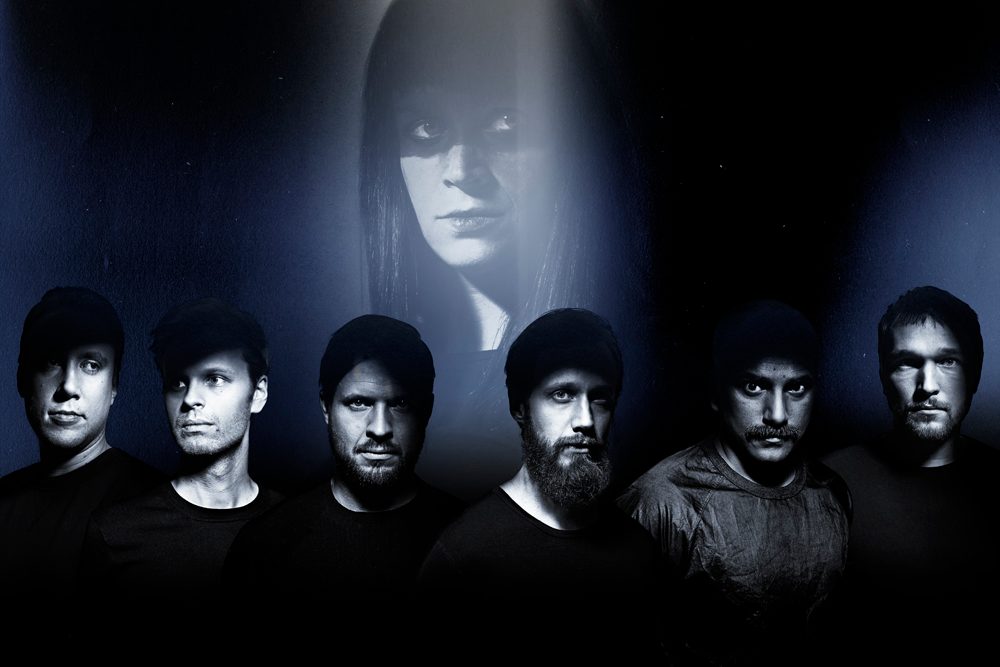

The impression of an artist derived from their album often vastly differs from the reality of the experience. Sitting with a piece of entertainment, we often form notions of what the character behind the work is like, presupposing a persona that has more to do with what we hope they will be like than the truth. When an artist is responsible for a near-perfect release, these assumptions can balloon into mythic proportions. It is easy for anyone to forget that even the most offbeat and ingenious artists are just ordinary people. Sometimes an imposing demeanor can belie a truly generous, warm and friendly person.
Amidst the frantic frenzy of the annual Psycho Vegas festival heading backstage to interview a band, you could almost disappear into the framework — one more body sliding by as dozens prepare for what comes next. Following this path leads me to the dressing room where the members of Cult of Luna and Julie Christmas are unwinding after their main stage performance.
Given the superb intricacy of Cult of Luna and Julie Christmas’ 2016 collaborative effort Mariner, one envisions the kind of mad scientists who would sit stoically, pensively answering obtuse questions with one-word vague statements. Such immaculate songcraft surely cannot be the by-product of any normal person who was born like the rest of us, lo, they must have descended from a spaceship or spontaneously emerged like Doctor Manhattan in the classic graphic novel The Watchmen. Nothing could be further from the truth.
Lead singer Johannes Persson greets me with a handshake and a warm smile. A beer is offered and happily accepted. He’s soft-spoken and thoughtful. Happily explaining his adventures in Los Angeles prior to the beginning of this U.S.A. tour—the only North American dates they’ve done behind Mariner. He’s excited because he packed fewer back-up instruments so he could fill one whole suitcase full of vinyl mined from L.A.’s many great record stores. Persson has played guitar and sung in Cult of Luna for almost twenty years, playing on six full-length albums prior to the album with Christmas. As he tells me of his L.A. adventures, numerous band members swirl about having conversations in the crowded dressing room.
Julie Christmas sits on a couch lounging backwards at an angle, holding court with several of the people present. She has a jubilant energy that is apparent in both her diction and her laugh. She is opinionated but in generous and mirthful ways. The rest of the people present clear out of the dressing room so the interview can begin. Christmas offers right away that she believes Persson is better at interviews. “I think it’s because his first language is Swedish,” she says. “When he answers a question, he answers it simply and quickly and he cuts right to the chase.”
Persson immediately quips in response, “I do. I’m the biggest bullshitter in Swedish though.” He offers that he finds Christmas’ answers to be “very entertaining.”
“He’s giving me credit because I made one… Silver Surfer reference, his eyes lit up,” Christmas replies. “I know that’s why, because I got one text from him, ‘This is why Julie is better at interviews.’ But I knew it didn’t have anything to do with the rest of the interview. It’s just that he’s a comic nerd and I said Silver Surfer.”
This opens up a whole line of discussion regarding my recent sale of the comic book that contains Silver Surfer’s first appearance (Fantastic Four #48 for all you comic fans out there). Persson excitedly asks, “Could you get me part one through three of the first Aliens Vs. Predator?” He explains how he had spent a great deal of time trying to track them down and even ordered one to be delivered to his brother in Los Angeles. When he went to pick it up though, it was only #4 of the series.
Christmas also pursues fascinating activities outside of music. No kidding, she has a business where she teaches science to children. She opts not to reveal the name of the business but speaks proudly of her journey to begin the endeavor. “I’m a big fan late in life of science,” she declares. “By late in life I mean, I went to Laguardia [High School of Music and Art]. I went to Juilliard before I dropped out. I went to all music schools for voice.” This lasted for a while, but ultimately a teacher had a profound and transformative effect on her life. “I was touring and I was working,” she explains. “I realized that I needed to keep making my life go further. I had to take a bio class…I had this professor and the professor was a fucking awesome professor. He was great and he was teaching at the school because he wanted to effect change in people that could take it farther. I will never forget this person.”
Christmas ponders her words deeply as she spins out the story of an experiment this professor demonstrated for his students. “First of all he turned off the lights in the first class,” she explains. “I was dreading going because my sister was great in science and math. My brother is great at science and math. I was the singer. I was the stupid one. Definitely my father told me many times that was the case. But I went into this class and I watched a cell divide. It was like…. a light bulb went off, my heart broke. It was all this stuff all at the same time.”
The hunt was on for Christmas from there as she began to consume all the science information she possibly could. “I went up to him after class,” she says. “He gave me a book. I read it. He gave me three more books. I read those. I read like, five books. Then he said, ‘Hey, I think you should try out for this program here.’ I went and met this professor and he said, ‘I’m going to put you right into the honors program.’” Christmas rocketed into more advanced science quickly from that leaping off point, ultimately landing at her science education business. “Then I went and did Alzheimer’s research at Columbia,” she explains. “It started to go from there, but it was mostly because I had a couple of really great teachers, one who helped me through science and one who helped me through math [later in life]. It was just because I didn’t get the enthusiasm that I needed at a young age. So I now have these businesses where I teach children to be excited about science.”
“She actually has a job that makes the world a better place,” Persson throws in with sincerity.
Christmas offers that the drive to create a business around furthering science education was partially motivated by how limiting public school curriculum is. “I was a science teacher for ten years after Columbia,” she says. “I realized I was doing a great job. But you can’t make a big enough mess in public school. You can’t do whatever you want. And public school education that’s slanted towards science doesn’t have fucking dinosaurs in it?” For her, it was an imperative to teach her young students about dinosaurs. “Every little kid in the world loves dinosaurs,” she professes proudly. “I opened my own place so I could do dinosaurs.”
Following her excellent 2011 release The Bad Wife, Christmas was largely out of the spotlight focusing on her own endeavors. After making contact with Cult of Luna they initially spoke about Christmas performing at London’s Beyond the Redshift Festival, which Cult of Luna were curating that year. The performance didn’t end up working out, but the group kept in touch and slowly began recording music across continents. The early results were so strong the band asked Christmas if she would be interested in doing a full album together. She agreed and the album Mariner was constructed over the period of a year. Cult of Luna constructed all of the instrumentation in Sweden, sending Christmas tracks digitally. Christmas, in turn, recorded vocals separately in New York City. The end results are breathtaking. The five-song album is an amorphous and awe-inspiring journey. The music and voice undulate and shift through each segment, evoking a story of solitude, desperation and sometimes even violence.
How did something so excellent and articulate come into existence? Perrson says the results were the culmination of the collaborative effort. “It’s cognitive decisions of course, but it’s not only mine,” he explains. “When I start writing songs, I write on guitar…I write the skeleton. Which pretty much means, okay, I kind of very roughly decide how I think the song needs to go. In this space something needs to happen, ‘Fredrik, I know you’re an amazing guitarist. Do something.’” From there, each of the band members will help evolve the music. “We do some keyboards,” Persson continues. “We’ll put that in there. The hills are getting steeper. The [original] skeleton is not steep at all. Then refine, then refine, then refine.” He had a vision of how Christmas’ voice might fit into the songs, but ultimately her keeping to what she thought fit best is why the end result worked. “I had a pretty good idea of how I wanted the vocals to match that and Julie just stepped on it and spat on my ideas and made it hers,” he says. “Which made so much more sense.”
As the music was constructed, Christmas tried to extrapolate from suggestions what vocal treatment might best fit the music. These suggestions literally came in the form of a recorded sample track. “I realized that we had such a short amount of time and we hadn’t talked at all,” says Christmas. “They sent me music and the communication was really like a track. There were some ideas, but because we had never met or I had no idea what these people were like, I tried to decipher what he was saying because I respect what they’re doing.”
Ultimately, Christmas had to trust her instincts and make the creative decisions that felt most natural for her. “I got some direction from Johannes about how he wanted things to go, but there were like two conversations,” she continues. “The ideas were very vague. It was like, ‘Put more space,’ but ‘put more space’ is like… I kind of knew what he meant, but I didn’t. So I tried, and then I just said ‘Fuck it. I’m doing whatever I want.’ And they were cool with that, which is the reason that it’s working out.”
Perrson was surprised by Christmas’ new approach but instantly embraced it as a better way to bring the songs together. “From my perspective, with how stressful the timing and all that was, I wrote instructions of how I wanted it,” says Perrson. “I got something back that was not at all what I intended. ‘Oh that’s good. Maybe it could be like this?’ I said. And then I got a response [from Christmas], ‘Screw it. I’m just going to do it the way things turn out.’ It was this kind of eye-opening experience.” For some that might have been an exercise in relinquishing control, but for Persson, this was exactly the reason Cult of Luna and Julie Christmas were meant to work together. “There’s a reason why we even talked about doing a collaboration because I love her work,” he says emphatically. “I’m just going to let her do what she does.” He also indicates that it was Christmas who talked him into providing vocals on the album as well.
With time running out I shift course to ask about perhaps the most important topic of the conversation: whether Mariner was a one-time collaboration or whether they have discussed continuing to do another album or tour together. “For me, I think that whatever comes up it’s important that there’s a lot of passion there,” says Christmas. “So I really can’t say what’s going to come next because I have no idea. I would love to work with these guys again. There are other things open as well. I’m not going to guess. I’m just going to see what happens. I have no idea. It’s too busy. It’s a busy time. One of the reasons this works is because these guys all go home and they all have their own busy, productive lives. I do as well. Who knows?”
Christmas and I look over at Persson who instantly responds humorously with a smile. “Copy, paste,” he says. After a laugh from all, he continues, “I would love to work with Julie again. It’s all a matter of time. I really hope it will happen but like Julie said, we’re all super busy. We kind of hibernate for a while. When we really start working we kind of write five to ten songs very quickly. But who knows if that happens.” Even the Cult of Luna members live further apart than one would think. “We’re so spread out,” he explains. “We have a hard time practicing just us. We live in different parts of Sweden. That’s why our band is almost like a collective more than a band. It’s always me, Frederik [Kihlberg], Andreas [Johansson] and Kristian [Karlsson]. We have different drummers. Our main drummer, Thomas Hedlund, is very busy with other bands. He’s still a very big part of our sound. But when he can’t do it, Magnus [Lindberg], he’s kind of our band studio technician, he plays drums live.”
Whether Mariner is the only collaborative Cult of Luna and Julie Christmas album or not, it has managed to defy conventions and expectations in an increasingly insular metal community. A good portion of music fans never really venture far into what heavy music can be. Whether it is because of personal taste or a dislike of aggressive tonality, a vast universe of music goes unnoticed except for avowed metal enthusiasts. Those that are on the side, average fans of heavy music, are super particular about what constitutes “good” or “correct” metal music. Spend some time talking to a professed metalhead and you find that more often than not, they are deeply concerned with whether a band is heavy or aggressive enough. It is seldom that something as evolved and challenging as Mariner gains a significant following. For Perrson and Christmas, whether fans would find the piece acceptable or not, never really crossed their minds.
“Who cares?” says Christmas sternly. “You know what I think? If people get into the label before they listen to the music, then fuck them. That’s what I think. You listen to a piece of music. You go see a piece of art. If it touches you, it does. If it doesn’t, it doesn’t. But if you close yourself down because the fucking nametag is not right, then fuck you.”
Similarly, Persson is unconcerned what people think but perhaps more diplomatic. “As a musician, as anyone that does anything, it’s good to hear that people like it,” he begins. “I think that anyone that says they don’t care is a liar. We all have egos of some sort…But all of us do appreciate when people like what we do. We had some talk about that with the band when we got into this. Very rarely, but sometimes when we got into that discussion [we would wonder], ‘How will people perceive this?’ We kind of came to the conclusion, ‘Look, screw this. We have done this for so many years. And we’re too old to start caring now.’ If we think it’s good, if things we’ve done in the past we thought they were good, and people liked it [in the past], well maybe they’ll like it now.” That confidence in their work is ultimately what allowed them to make Mariner the stellar and challenging record it became. “This is just what we’ve done with this record,” he concludes. “It was just something that needed to be done. I had no idea how it would sound or how people would pigeonhole it in terms of genres.”
With that, we shift out of the interview and back to normal conversation. Persson is thoughtful and continues to offer his views on the final question about whether fans would find their collaborative output acceptable. Christmas pulls me aside and speaks enthusiastically about how much conviction matters to performance. She excitedly talks about how raw and believable she finds Kendrick Lamar’s music to be. Ultimately, in what is a very short break before they have to head off to load-out in preparation to hit the road for the remainder of their sole U.S. tour together so far, they are generous beyond words with their thoughts and their time. On stage and on record they play with ferocity and a passion for excellence that belies their kind nature. One might have thought artists capable of creating art so fierce and chilling would have been harder to interface with, but Christmas and Persson are friendly and charming in ways that are utterly disarming. It might seem surprising, but the pairing of these two kind souls has produced an elaborate, modern classic. Mariner is a rare album done using the attributes of heavy music but reinvents the medium as a whole. It goes beyond a singular classification and is simply a wonderful piece of art that takes the form and shape of whatever it needs to be to render its point with verve and power.
All photos by Raymond Flotat









